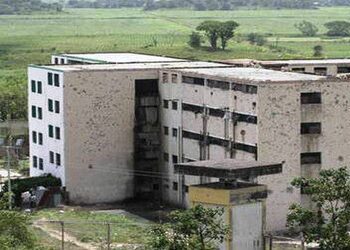BY JEREMY MCDERMOTT InSight Crime
Early in the morning of September 20, 11,000 members of the Venezuelan security forces deployed around the notorious prison of Tocorón in Aragua state, the home base of the country's most powerful criminal structure, the Tren de Aragua.
“The Bolivarian Government informs that the Cacique Guaicaipuro Liberation Operation has been underway since the early hours of the morning. Its objective is to dismantle and put an end to organized crime gangs and other criminal networks operating from the Tocorón Penitentiary, to the detriment of the tranquility of the Venezuelan people,” read an official communiqué.
Residents living near the prison were awakened by the sounds of armored vehicles speeding towards the prison, in what is one of the largest deployments ever of the Venezuelan security forces.
The simple fact that the operation, named after a legendary native chief of the 16th Century, needed 11,000 soldiers and officials speaks to the power of the Tren de Aragua and its leader Héctor Rusthenford Guerrero Flores, alias “Niño Guerrero,” in Tocorón.
The prison, which is in the central state of Aragua and home to some 7,000 inmates, is one of the biggest in the country.
InSight Crime Analysis
This operation, the first against the Tren de Aragua, and the largest of its kind to date, is a clear show of force by the Venezuelan government.
Tocorón has long been home to the Tren de Aragua and Niño Guerrero, who ran the prison like his personal fiefdom with the blessing of the prison ministry (Ministerio de Poder Popular para el Servicio Penitenciario). Niño Guerrero, imprisoned for murder, was the “pran” of Tocorón prison, essentially the criminal warden in a system set up by the first Prison Minister Iris Varela, now Vice President of the National Assembly. The pran system saw inmates take control of several prisons across the country in exchange for maintaining order, reducing homicides, and ending jail uprisings.
This operation might signal the end of the pran system, something suggested in the official communique of the operation, which stated that the operation was to “restore and dignify the penitentiary system.”
The question now is whether this operation will disrupt the leadership and running of the Tren de Aragua, a transnational criminal structure with thousands of affiliates with a presence not only across Venezuela, but in Colombia, Peru, and Chile. The Tren de Aragua has projected power abroad, riding off the backs of the more than seven million Venezuelans who have fled the economic collapse and authoritarian regime presided over by President Nicolás Maduro.
What has prompted Maduro to act after years of tolerating the criminal fiefdom of Tocorón? The Venezuelan president has long tolerated criminal structures operating in the country, both Venezuelan and Colombian, because he needed access to criminal rents to maintain the loyalty of key generals and political figures, as the state teetered on the brink of bankruptcy.
However, since 2020, the Venezuelan security forces have moved against several defiant criminal groups, like the megabanda of Carlos Luis Revete, alias “El Koki,” and dissident elements of the rebel group the Revolutionary Armed Forces of Colombia (Fuerzas Armadas Revolucionarias de Colombia – FARC), which set up drug trafficking infrastructure in the Venezuelan department of Apure. The operation against the ex-FARC saw the deployment of significant military forces, which ended up humiliated by the Colombian rebels, who captured eight soldiers and forced a military withdrawal. This might explain the apparent overkill with the Tocorón operation: Maduro clearly did not want any further defeats or humiliations.
Another factor might be the upcoming 2024 presidential elections. Maduro is keen that these elections, unlike those held in 2018, are recognized as legitimate by the international community. It could be that moving against some of the most notorious Venezuelan criminal groups, especially those with transnational reach, is an attempt to polish up his credentials, both at home and abroad, as the political campaign ramps up.
There have been calls from Colombia, an important ally for Maduro, to act against Tocorón and the Tren de Aragua, after a series of murders in the Colombian capital of Bogotá were linked to the Venezuelan gang.
Find the original article in its entirety on InSight Crime.



Yeah.. now take your check and get a boat ride on down to Tocorón to see ya people; they got an empty cell for ya!
Yeah.. now take your check and get a boat ride on down to Tocorón to see ya people; they got an empty cell for ya!
Wow whole prison behind crime spree
Stick your check where the sun don t shine,the partition in between your cheeks.